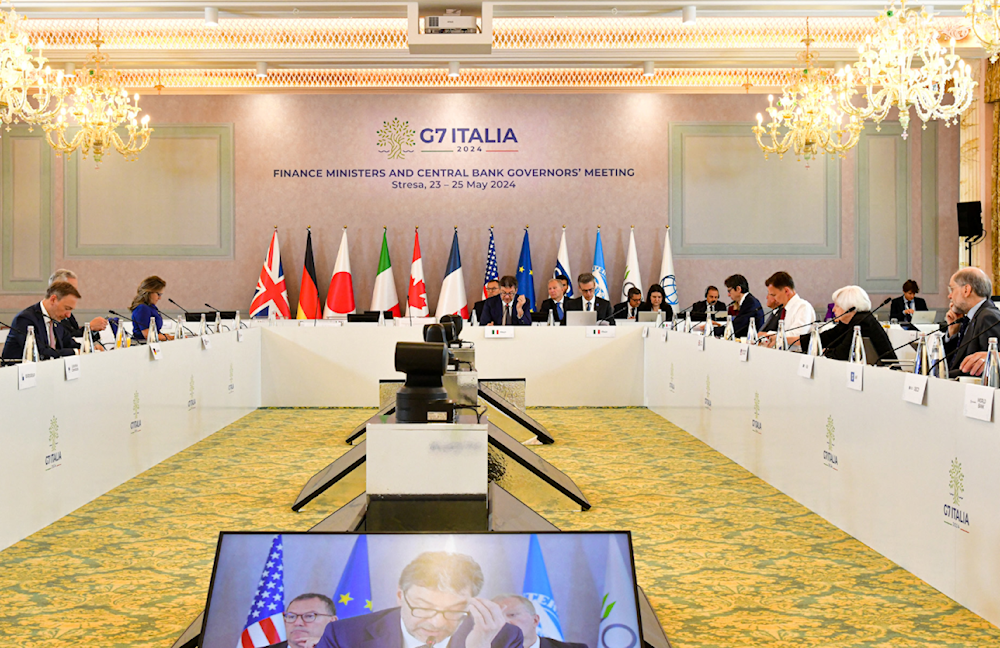G7 ministers on Russian assets: No done deal despite 'progress'
In their final statement, the ministers cite "progress" in the talks in ways that are "consistent with international law and our respective legal systems."
-

The last day of the G7 Meeting on Finance in Stresa, Italy on May 25, 2024 (X photo, @G7)
The G7 finance ministers acknowledged, as they concluded a meeting Saturday, "progress" in determining how to use frozen Russian funds to aid Ukraine, envisioning a concrete proposal to present to a leaders' summit next month.
The two-day Group of Seven summit in Stresa, northern Italy, focused on finding alternatives as Kiev continues to plead for extra funding.
In their final statement, the ministers cited "making progress" in the talks in ways that are "consistent with international law and our respective legal systems."
According to Italian Finance Minister Giancarlo Giorgetti, they want to deliver a plan "defined in all its dimensions" to G7 leaders ahead of a meeting in Puglia, southern Italy, on June 13-15.
Although Giorgetti cited progress, he noted that there has not been a final solution due to "significant technical and legal issues," reassuring that there is "firm determination to arrive at a solution."
In their closing statement, the G7 finance ministers emphasized that Russian assets frozen by the Group of Seven states "will remain immobilized until Russia pays for the damage it has caused to Ukraine," stressing that they were determined to uphold sanctions, particularly in the energy sector.
The G7 is "ready to impose sanctions on individuals and entities that help Russia acquire advanced materials, technology, and equipment for its military-industrial base," they stated.
Meanwhile, Fabio Panetta, the governor of the Bank of Italy, has stated that Italian banks should leave Russia due to a reputational issue, even though doing so would be hard and expensive.
The conference concluded a day after the United States unveiled a new $275 million section of funding for Kiev as part of a $61-billion military aid package approved by Congress last month.
Starting the meetings in Stresa, US Treasury Secretary Janet Yellen asked her partners to examine "ambitious options" in determining how to utilize the frozen Russian assets.
A controversial US plan would use the income produced by the G7 and EU's freeze on 300 billion euros ($325 billion) of Russian central bank assets to create a $50 billion lending facility secured by future interest on the assets.
According to Bloomberg, the European Union agreed on a plan on Tuesday to utilize the income from blocked Russian sovereign assets to boost Ukraine's rehabilitation and military spending.
G7 may take measures against China
The G7 ministers also criticized China's trade practices and industrial overcapacity, suggesting that the bloc may take action to offset them.
The United States has led concerns that a spike in low-cost Chinese exports, fueled by Chinese government backing in critical industries such as solar and electric cars, poses a risk to global market stability.
"While reaffirming our interest in a balanced and reciprocal collaboration, we express concerns about China's comprehensive use of non-market policies and practices that undermine our workers, industries, and economic resilience," the statement read.
The Group of Seven would "continue to monitor the potential negative impacts of overcapacity," as well as "consider taking steps to ensure a level playing field," it stated.
The impartial Atlantic Council, located in Washington, stated on Saturday that "no white smoke emerged from the meeting" of finance ministers, noting "small, sensible" measures toward tougher Russia sanctions.
"Success at the Italy summit cannot be taken for granted," said the council's John E. Herbst, a former US ambassador to Ukraine, citing G7 states' worries about reprisal from Russia.

 4 Min Read
4 Min Read









